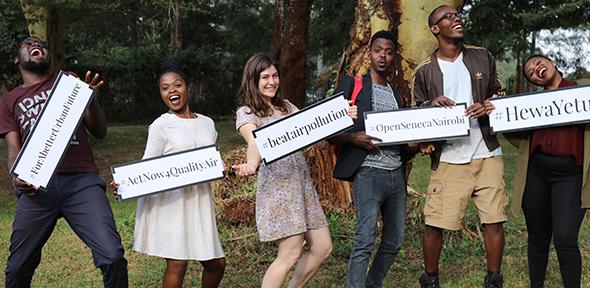
Submitted by K E Scrivener on Thu, 24/09/2020 - 22:09
As one of three winners of the Women4Climate Tech Challenge, Lorena Gordillo-Dagallier from the University of Cambridge secures funding and support to pilot the Open-seneca initiative's community air-quality-tracking project in Stockholm and Lisbon.
Lorena Gordillo-Dagallier, a second year PhD student at the Department of Chemical Engineering and Biotechnology’s Centre for Doctoral Training in Sensor Technologies, is one of three winners of the Women4Climate Tech Challenge, announced at the final yesterday evening.
As a winner, Gordillo-Dagallier and the Open-seneca team have been awarded the opportunity to pilot their community-driven air quality monitoring project, in Lisbon and Stockholm, with full support and funding.
Open-seneca is an initiative working to highlight and install mobile air quality sensor networks throughout cities. The project evolved from the team challenge of the Sensor CDT 2017 cohort, and is run by a team of six students (Charles Christensen, Christoph Franck, Lorena Gordillo-Dagallier, Peter Pedersen, Raphael Jacquat and Sebastian Horstmann) who work on the project in their spare time, around their PhDs.
Lorena Gordillo-Dagallier said: "This is such an exciting opportunity to work closely with the cities of Lisbon and Stockholm in engaging citizens in the fight for clean air.”
The mobile sensor network takes a unique approach in involving ‘citizen scientists’ to capture and record air pollution data across the city. With small sensors that can be attached to pedal bikes, motorbikes and scooters, as well as cars, the volunteers are able to easily track pollution levels as they go about their day-to-day lives.
The aim of the initiative is to raise awareness within communities about personal exposure to particulate pollution while creating pollution maps that can be used to inform policy and urban development.
"We all hear every day about the problems of air pollution and climate change,” says Gordillo Dagallier. “However, most people do not see it as a personal issue and there is a lack of motivation for change. I used to be one of them. But now I am aware, and I want to raise awareness around me.”
In addition to providing sensors, the initiative also aims to educate communities through a series of practical workshops in the hope to drive behavioural change and change attitudes.
Open-seneca has already established pilot projects in Nairobi, Kenya, and Buenos Aires, Argentina. The Nairobi project is supported by volunteers in Nairobi Makerspace, and in Buenos Aires, the project is driven by policymakers in the Argentinian government, who are keen to provide data-led arguments encouraging citizens to change their habits.
The Women4Climate Tech Challenge is a joint initiative from the VELUX Group and C40, alongside four C40 host cities: Lisbon, Los Angeles, Stockholm and Tel Aviv-Yafo. Its main aim is to support and promote diversity and inclusion in technology, innovation and the built environment sectors.
Along with nine other finalists, Gordillo-Dagallier was due to pitch her solution live in Lisbon, Portugal, in May this year, but due to the COVID-19 pandemic, the event took place virtually last night.
Fernando Medina, Mayor of Lisbon said: “The W4C Tech Challenge competition was fierce, with a lot of very high-level applicants. However open-seneca combines two of Lisbon’s core values: citizenship engagement and sustainability. By collecting and sharing data on their own exposure to air pollution, we will empower citizens to think about air quality and what each one of us can do to improve it. We’re excited to have the opportunity to pilot this technology so we can in the near future, use this data for better informed decisions.”
Following pitches from the ten finalists, each of the four cities could choose a project to support and pilot. Both Lisbon and Stockholm chose to work with Gordillo-Dagallier, so she is one of three winners announced yesterday evening.
The pilots established so far have been in cities with no existing air pollution monitoring, but the challenge in Lisbon and Stockholm, two of the greenest cities in the world, will be a little bit different.
“They already have an established air pollution monitoring network, so for this case, it’s more about getting citizens involved and complementing this current network,” explains Gordillo Dagallier. “Stockholm and Lisbon are considered the greenest cities, so they are very aware, but they still don’t have very granular data. They have stationary reference stations around the city but they don’t know street-by-street level, which areas are having problems and where they need to prioritise resources.
“There’s also the link between citizens and decision-makers which is where we would want to focus. We would like citizens to be engaged in the search for solutions and suggest and try solutions themselves.”
Anna König Jerlmyr, Mayor of Stockholm said: “By gamifying air quality measurement and pairing it to bike commuting, we are confident that open-seneca has the potential to increase the well-being of our citizens. We strongly believe that involving citizens can help raise awareness on the impact of air quality and the need to rethink the design and mobility modes in our cities.”
Gordillo-Dagallier and the Open-seneca team, and the other successful entrepreneurs will now see their innovations brought to life in their host cities, with $50,000 in funding to be split amongst the winning projects and used to support their experimental phase in each city.
“It was a very rewarding experience to get to work with other finalists in preparation for the final pitch and see everyone deliver such inspiring pitches today,” said Gordillo-Dagallier.
“I thank the C40 Women4Climate team for bringing us together and all the support we've received over these past months. Having open-seneca as one of the winning projects of the C40 W4C Tech Challenge 2020 has only been possible thanks to our very passionate team and all the support received from the university, especially the Sensor CDT, the Centre for Global Equality, and our partners all over the world. Thank you to you all."
About the Women4Climate Tech Challenge
The Women4Climate Tech Challenge is a joint initiative from C40 Cities and the VELUX Group. The Challenge aims to support and promote diversity and inclusion in technology, innovation and the built environment sectors. All the projects judged in the competition were led by women; address urban sustainability, mobility, food, waste, water, building, urban farming, air quality solutions; deliver measurable impacts; and have the potential to be scalable in other cities. All three winners of the Women4Climate Tech Challenge were selected and chosen for their forward thinking and innovative solutions.
Read more here


